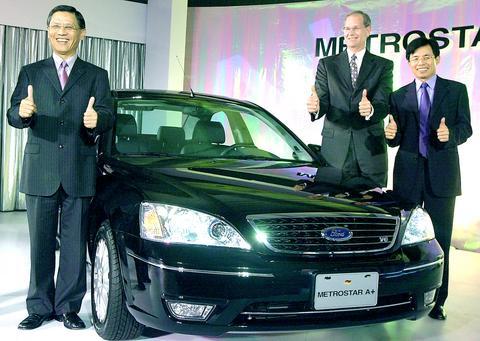New car sales in Taiwan are expected to grow by up to 10 percent next year from this year, thanks to strong consumer spending, industry officials said yesterday.
"We're optimistic about Taiwan's auto market. Car sales are likely to grow steadily by up to 10 percent next year," said Liu Yi-cheng (劉一震), president of Yulon Nissan Co (裕隆日產), a spin-off unit of Yulon Motor Co (裕隆汽車).
The automaker predicted the domestic market would consume a total of 400,000 cars this year, up from around 380,000 units sold last year.

PHOTO: LIAO CHENG-HUEI, TAIPEI TIMES
Liu expected Yulon, the third-largest car manufacturer in Taiwan with a market share of 16.79 percent, to sell about 70,000 units next year, up 7.7 percent from the company's target of 65,000 units for this year.
During the first nine months, Yulon doubled its pre-tax profits to NT$6.84 billion from a year ago, or earnings-per-share of NT$3.7. The automaker reported an increase of 20.7 percent in revenue in the first nine months from a year ago.
Chen Kuo-rong (
Two-thirds of the NT$6.84 billion in earnings came from Yulon's Chinese unit, Fengshen Automotive Co (
Echoing the upbeat projections for next year, Steve Yang (
"We believe 2004 will be a better year, as the economic outlook for next year is brighter. And that plays a crucial role for consumers when they decide to whether or not to buy a car," Yang said, adding that there is even a chance of breaking the record 400,000 units next year.
Hotai, which sells Toyota Motor Corp brand sedans to local consumers, is Taiwan's No. 1 car vendor with about 24.4 percent of market share in terms of car sales in the first 10 months.
The company hopes to sell about 100,000 cars this year, Yang said.
The Hotai official warned that a possible recurrence of the SARS outbreak and the presidential elections in March could weigh on the car market, as uncertainty could hurt car sales.
Looking at the market from a long-term perspective, Yang predicted that car sales would rise to a reasonable level of about 420,000 to 450,000 units within the next five years.
Ford Lio Ho Motor Co (福特六和), Taiwan's No.4 car maker with about 11.9 percent of the local market, also espoused an upbeat view about next year, but disagreed with the idea that the presidential election would pose a threat to local auto sales.
"Fundamentally, it doesn't matter who's going to be the president. Those who can afford a car will still be able to afford," Robert Le Vert Phebus, director of finance at Ford Lio Ho, said yesterday while introducing two revamped Metrostar sedans.
The 2.0-liter model Metrostar is priced between NT$719,000 and NT$819,000, while the 2.5 model is retailed for between NT$860,000 and NT$929,000.
Phebus said his company expected its sales to increase by a single digit next year after posting 5 percent to 10 percent growth both in sales and revenue this year to US$1 billion from last year. Ford is expecting to sell 50,000 units this year.

Taiwan Semiconductor Manufacturing Co (TSMC, 台積電) halted shipments to a customer this month after its semiconductors were sent to China’s Huawei Technologies Co (華為), potentially breaching US sanctions, a government official said. The US slapped sanctions on Huawei in 2019, and expanded them the following year, over fears its technology could be used for Beijing’s espionage operations. The restrictions prevent TSMC from selling semiconductors to Huawei. However, TSMC discovered on Oct. 11 that chips made for a “specific customer” had ended up with the Chinese company, a Taiwanese official with knowledge of the incident said on the condition of anonymity. TSMC “immediately activated

US SANCTIONS: The Taiwan tech giant has ended all shipments to China-based Sophgo Technologies after one of their chips was discovered in a Huawei phone Taiwan Semiconductor Manufacturing Co (TSMC, 台積電) suspended shipments to China-based chip designer Sophgo Technologies Ltd (算能科技) after a chip it made was found on a Huawei Technologies Co (華為) artificial intelligence (AI) processor, according to two people familiar with the matter. Sophgo had ordered chips from TSMC that matched the one found on Huawei’s Ascend 910B, the people said. Huawei is restricted from buying the technology to protect US national security. Reuters could not determine how the chip ended up on the Huawei product. Sophgo said in a statement on its Web site yesterday that it was in compliance with all laws

TECH TITANS: Nvidia briefly overtook Apple again on Friday after becoming the world’s largest company for a short period in June, as Microsoft fell to third place Nvidia Corp dethroned Apple Inc as the world’s most valuable company on Friday following a record-setting rally in the stock, powered by insatiable demand for its specialized artificial intelligence (AI) chips. Nvidia’s stock market value briefly touched US$3.53 trillion, slightly above Apple’s US$3.52 trillion, London Stock Exchange Group data showed. Nvidia ended the day up 0.8 percent, with a market value of US$3.47 trillion, while Apple’s shares rose 0.4 percent, valuing the iPhone maker at US$3.52 trillion. In June, Nvidia briefly became the world’s most valuable company before it was overtaken by Microsoft Corp and Apple. The tech trio’s market capitalizations have been

Shares of Starlux Airlines Co (星宇航空) surged more than 53 percent on its debut on the Taiwan stock exchange yesterday. Starlux shares closed up 53.75 percent at NT$30.75 from its initial public offering price of NT$20 after retreating in late trading from a 60 percent rise. China Airlines Ltd (CAL, 中華航空) rose 0.90 percent to close at NT$22.35, while EVA Airways Corp (長榮航空) gained 0.40 percent to close at NT$37.70. In Taiwan, a newly listed stock is allowed to go beyond the 10 percent maximum increase or decline in its first five trading sessions. At the listing ceremony, Starlux chairman Chang Kuo-wei (張國煒) said